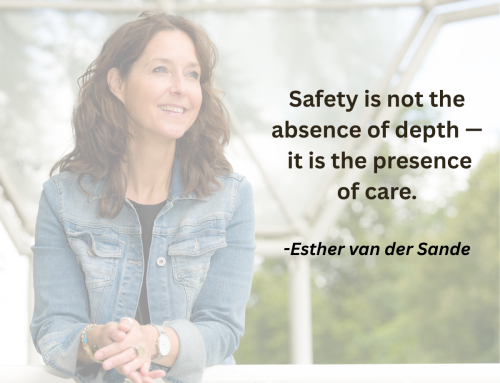Psychological Resilience and Collective Well-Being: Building a Stronger Organization Through Trauma-Sensitive Care
By Esther van der Sande
In times of continuous change, organizations face the growing challenge of building resilience. The focus has shifted from simply helping individuals recover from stress to creating a shared culture of resilience and well-being. Collective well-being is more than the sum of individual wellness; it is a dynamic force that enables organizations to thrive, even in difficult circumstances. How can trauma-sensitive principles contribute to developing a culture of empathy, resilience, and connection? In this article, I will share my experience as a consultant and explore how centering care within organizations can strengthen collective resilience.
The Power of Psychological Resilience in Organizations
Psychological resilience is not just about withstanding challenges, but about learning from them and coming back stronger. Organizations need to go beyond crisis management and focus on creating a culture where everyone feels seen and valued. Employees should have the freedom to learn from mistakes and space to grow, even after setbacks.
In my work as a consultant, I often see how important trauma-sensitive care is in this process. One example is when I worked with a team after a major restructuring. The uncertainty had caused stress and anxiety, impacting productivity and collaboration. We created a safe and supportive environment where employees could communicate openly and regain control over certain aspects of their work. This not only restored their resilience but also boosted trust and engagement.
As I’ve learned from experience: “Resilience is not about avoiding setbacks, but about how we rise together after each fall.”
Collective Well-Being: The Heart of Healthy Organizations
Collective well-being is much more than the sum of individual achievements. It forms the backbone of thriving organizations, especially in uncertain times. Teams that learn and grow together build stronger bonds of trust. Trauma-sensitive care recognizes that safety and trust are essential for sustainable growth. It provides space for vulnerability and encourages employees to show up authentically, even when circumstances are challenging.
Trauma-sensitive organizations often ask themselves key questions:
- How do we ensure safety in everyday interactions?
- How do we offer support without judgment or pressure to employees who are struggling?
- How do we ensure that every voice is heard, regardless of background or experience?
These questions guide the creation of an inclusive culture where well-being and resilience are shared.
Trauma-Sensitive Principles in Organizations
By applying trauma-sensitive principles, organizations can promote not only the resilience of individuals but also that of the entire team. Here are some core principles that I often apply in my work:
- Prioritizing safety: In a trauma-sensitive workplace, employees feel emotionally and psychologically safe. This safety encourages innovation and supports sustainable collaboration.
- Restoring control and autonomy: For individuals with trauma backgrounds, loss of control is a key issue. Organizations that promote autonomy, for example through flexible work schedules or decision-making, build trust and increase engagement.
- Connection through empathy: Empathy is a powerful tool, both on an individual and collective level. Trauma-sensitive organizations recognize that empathy is key to both healing and productivity.
- Transparency and predictability: Uncertainty can exacerbate trauma responses. Clear communication about changes and predictable processes helping to reduce stress and build trust.
Collective Resilience: A Philosophical Reflection
When I think about collective resilience, I draw inspiration from the idea that we are part of something greater. This aligns with the South African philosophy of “ubuntu,” which I have explored. Ubuntu means: “I am because we are.” This profound concept has deepened my understanding of the importance of interconnectedness within organizations and communities. It reminds me that individual well-being is closely tied to the well-being of the collective.
Trauma-sensitive organizations acknowledge this and place the well-being of the community above the individual. Collective care is not only beneficial for individuals but also an essential building block for the success of the organization as a whole.
Nelson Mandela articulated this beautifully:
“The true success of an organization is not measured by the performance of one person but by the strength of a community that works together and supports one another.”
Moving Forward
In these times of constant change and increasing pressure, trauma-sensitive principles offer a pathway to a stronger, more resilient organization. By putting collective well-being at the center, we create a culture where employees can not only survive but thrive.
This autumn offers a chance to reflect. How can we, as teams and organizations, better care for one another? By enhancing safety, autonomy, empathy, and connection, we build workplaces that can not only withstand the challenges of change but emerge stronger.
How will you contribute to your team’s well-being today? If you’d like to learn more about how trauma-sensitive principles can be applied within your organization, I invite you to a conversation. Together, we can build a resilient, inclusive workplace. Email: esther@esthervandersande.com
References:
- World Health Organization (WHO)
- Nelson Mandela, Long Walk to Freedom.
- Ubuntu: A philosophical concept focusing on collective humanity.





Leave A Comment